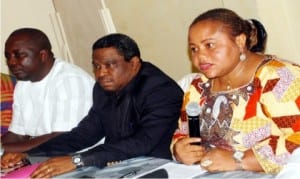Oil & Energy
Court Bars NERC From Implementing Proposed New Electricity Tariff

L-R: Senior Assistant General Secretary, Warri Zonal Council, NUPENG, Mr Otite Onohwowho; member, National stakeholders working group of Nigeria Extractive Industries Transparency Initiative (NEITI), Mr Bassey Ekefre and Chairperson, Neiti Civil Society Steering Committee, Ms Nwadishi Faith, at the NEITI Civil Society Steering Committee news conference on State of extractive sector in Nigeria, last Friday .
A Federal High Court in
Lagos has sustained its earlier order restraining the Nigerian Electricity Regulatory Commission (NERC) from implementing its new electricity tariff.
At the resumed hearing on Thursday, Justice Mohammed Idris ruled that “the ex-parte order earlier given remains valid and is subsisting”.
Idris had restrained NERC and the electricity distribution companies (DISCOs) from implementing any increment in electricity tariff it had planned to commence from June 1.
The judge gave the order in a ruling on an ex-parte application filed by a Lagos-based lawyer, Mr Toluwani Adebiyi.
“The policy to start billing electricity users on new charges should not commence pending the hearing and determination of this suit,’’ Idris had said.
At Thursday’s proceedings, Adebiyi told the court that all the processes in the matter, as directed by the court, had been served on NERC.
“NERC has seven days to respond on issues against it in this case, but the commission is yet to do so.
“I would have loved to proceed, but it will be fair to give the commission the benefit of doubt.
“I, however, urge this court to renew its earlier order so as to preserve the subject matter of this suit,’’ Adebiyi said.
Adebiyi was seeking an order restraining NERC from implementing any upward review of electricity tariff without a meaningful and significant improvement in power supply.
Adebiyi also wants NERC not to foist a compulsory service charge on pre-paid meter-users until there was efficient and reliable power supply like in other climes where the idea was borrowed from.
The petitioner, Adebiyi, is also asking the court to mandate NERC to make available prepaid meters to all Nigerians within a reasonable timeframe of two years to stop the throat-cutting, arbitrary and indiscriminate billing.
A legal officer with NERC, Mr Ifeanyi Umunna, said that the commission had complied with Idris’ interim orders.
He added that the commission was in the process of appointing a counsel to defend it in the suit.
“I beg this honourable court to grant us more time to do so,’’ Umunna said.
The court then adjourned the case to July 9 for hearing.
Oil & Energy
FG Explains Sulphur Content Review In Diesel Production
The Federal Government has offered explanation with regard to recent changes to fuel sulphur content standards for diesel.
The Government said the change was part of a regional harmonisation effort, not a relaxation of regulations for local refineries.
The Chief Executive, Nigerian Midstream and Downstream Petroleum Regulatory Authority (NMDPRA), Farouk Ahmed, told newsmen that the move was only adhering to a 2020 decision by the Economic Community of West African States (ECOWAS) which mandated a gradual shift to cleaner fuels across the region.
Ahmed said the new limits comply with the decision by ECOWAS that mandated stricter fuel specifications, with enforcement starting in January 2021 for non-ECOWAS imports and January 2025 for ECOWAS refineries.
“We are merely implementing the ECOWAS decision adopted in 2020. So, a local refinery with a 650 ppm sulphur in its product is permissible and safe under the ECOWAS rule until January next year where a uniform standard would apply to both the locally refined and imported products outside West Africa”, Ahmed said.
He said importers were notified of the progressive reduction in allowable sulphur content, reaching 200 ppm this month from 300 ppm in February, well before the giant Dangote refinery began supplying diesel.
Recall that an S&P Global report, last week, noted a significant shift in the West African fuel market after Nigeria altered its maximum diesel sulphur content from 200 parts per million (ppm) to around 650 ppm, sparking concerns it might be lowering its standards to accommodate domestically produced diesel which exceeds the 200 ppm cap.
High sulphur content in fuels can damage engines and contribute to air pollution. Nevertheless, the ECOWAS rule currently allows locally produced fuel to have a higher sulphur content until January 2025.
At that point, a uniform standard of below 5 ppm will apply to both domestic refining and imports from outside West Africa.
Importers were previously permitted to bring in diesel with a sulphur content between 1,500 ppm and 3,000 ppm.
It would be noted that the shift to cleaner fuels aligns with global environmental efforts and ensures a level playing field for regional refiners.
Oil & Energy
PHED Implements April 2024 Supplementary Order To MYTO
The Port Harcourt Electricity Distribution (PHED) plc says it has commenced implementation of the April 2024 Supplementary Order to the MYTO in its franchise area while assuring customers of improved service delivery.
The Supplementary order, which took effect on April 3, 2024, emphasizes provisions of the MYTO applicable to customers on the Band A segment taking into consideration other favorable obligations by the service provider to Band A customers.
The Head, Corporate Communications of the company, Olubukola Ilvebare, revealed that under the new tariff regime, customers on Band A Feeders who typically receive a minimum supply of power for 20hours per day, would now be obliged to pay N225/kwh.
“According to the Order, this new tariff is modeled to cushion the effects of recent shifts in key economic indices such as inflation rates, foreign exchange rates, gas prices, as well as enable improved delivery of other responsibilities across the value chain which impact operational efficiencies and ability to reliably supply power to esteemed customers.
“PHED assures Band A customers of full compliance with the objectives of the new tariff order”, he stated.
Ilvebare also said the management team was committed to delivering of optimal and quality services in this cost reflective dispensation.
The PHED further informed its esteemed customers on the other service Bands of B, C D & E, that their tariff remains unchanged, adding that the recently implemented supplementary order was only APPLICABLE to customers on Band A Feeders.
Oil & Energy
PH Refinery: NNPCL Signs Agreement For 100,000bpd-Capacity Facility Construction

The Nigerian National Petroleum Company Ltd (NNPCL) has announced the signing of an agreement with African Refinery for a share subscription agreement with Port-Harcourt Refinery.
The agreement would see the co-location of a 100,000bpd refinery within the Port-Harcourt Refinery complex.
This was disclosed in a press statement on the company’s official X handle detailing the nitty-gritty of the deal.
According to the NNPCL, the new refinery, when operational, would produce PMS, AGO, ATK, LPG for both the local and international markets.
It stated, “NNPC Limited’s moves to boost local refining capacity witnessed a boost today with the signing of share subscription agreement between NNPC Limited and African Refinery Port Harcourt Limited for the co-location of a 100,000bpd capacity refinery within the PHRC complex.
“The signing of the agreement is a significant step towards setting in motion the process of building a new refinery which, when fully operational, will supply PMS, AGO, ATK, LPG, and other petroleum products to the local and international markets and provide employment opportunities for Nigerians.
By: Lady Godknows Ogbulu
-
Niger Delta2 days ago
Monarch Fingers Political Class On Community’s Socio-economic Woes
-

 Rivers2 days ago
Rivers2 days agoFubara Tasks NYSC Members On Dedication
-
Niger Delta10 hours ago
Diri Promises Institute Smooth Take-Off
-
Sports9 hours ago
Legal Threat Hangs On FIFA Over Calendar
-

 Featured2 days ago
Featured2 days agoLady Fubara Restates Rivers’ Support For President’s RHI …As Mrs. Tinubu Launches RHI-WASP For S’South To Curb Food Crisis
-

 News1 day ago
News1 day agoNLC Rejects CBN’s Cybersecurity Levy
-
News10 hours ago
Reps Urge CBN To Halt Implementation Of Cyber Security Levy
-
News9 hours ago
Microsoft Nigeria Not Shutting Down, Presidency Replies Obi

